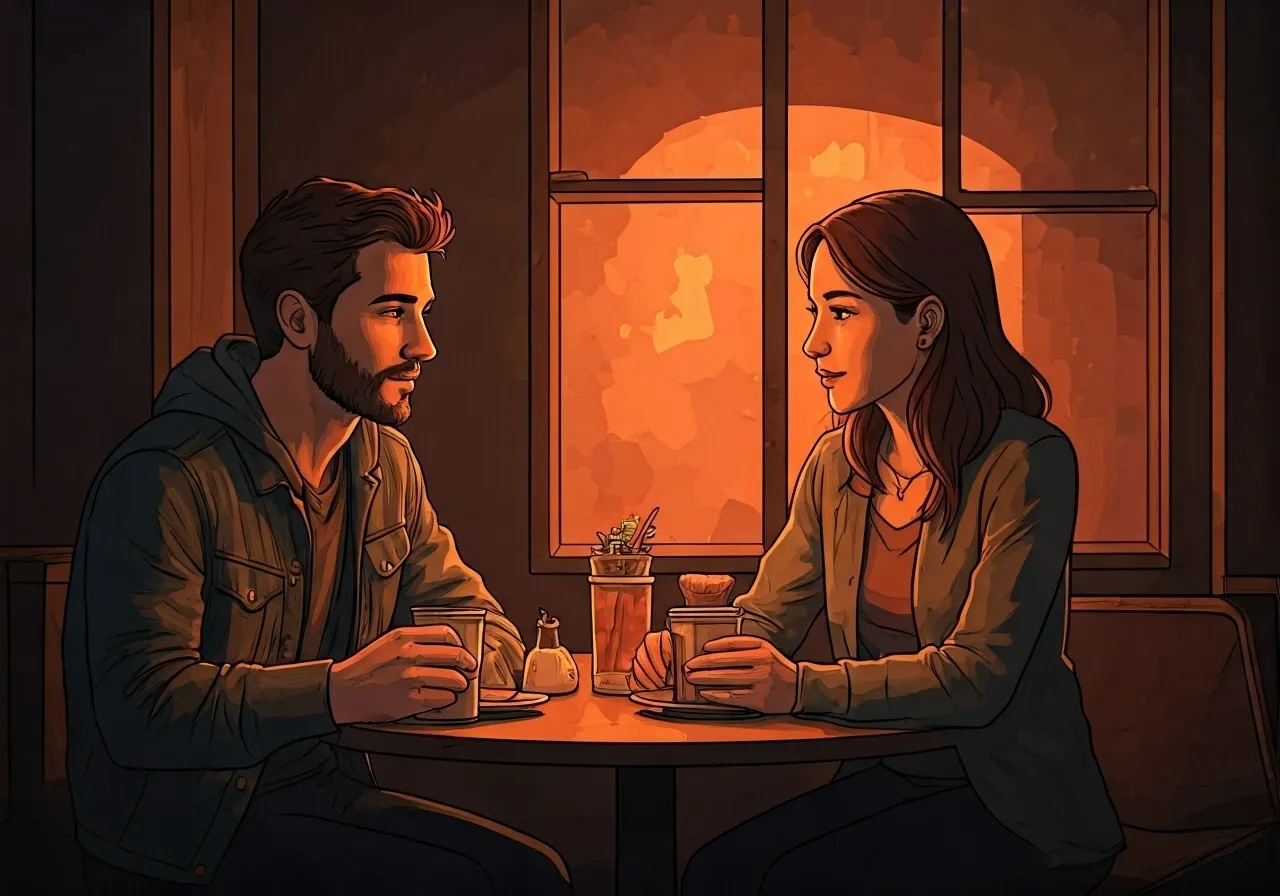Navigating feelings of loneliness in a relationship can be hard. It can affect mental health and well-being. Remember, feeling disconnected sometimes doesn't mean your relationship is failing. Engaging in activities like meditation can help in recognizing these feelings of loneliness, which is the first step. Once you understand them, you can work on the causes. This can help you build a stronger and more fulfilling connection with your partner.

Being in a relationship usually means having companionship and feeling close to someone. However, it's normal to sometimes feel lonely, even when you are a couple. Loneliness can show up in relationships that seem happy, and it can surprise you.
You might wish for a stronger emotional connection. You may want to spend more quality time together. Or you might feel like you are drifting apart from your partner. These feelings are real. It's important to know what is causing this loneliness so you can deal with it in a good way.
A romantic relationship should feel like a safe space where we are seen, understood, and cared for. However, the truth is that we can still feel lonely, even when we have love and commitment around us. This creates a strange feeling of being alone, even when we are with someone.
This sense of loneliness might come from a lack of deeper feelings in the relationship. You might be together physically, but the emotional connection and engagement may not be strong. This could lead to fewer meaningful talks, shared experiences, or a general feeling of being out of sync.
On the other hand, loneliness can also happen if you do not have fulfilling social connections outside of your relationship. If you depend too much on your partner to meet all your social and emotional needs, it might lead to feelings of isolation, even when you’re together, especially if it has been a long time since you had other fulfilling interactions.
Feeling lonely can happen because of several specific triggers, especially in relationships. One big reason is a lack of communication. When a partner’s behaviour, like pulling away emotionally or ignoring your efforts to connect, occurs, it can make you feel even more alone. If your partner spends a lot of time focused on their own activities and misses shared moments with you, this emotional distance and sense of rejection can lead to loneliness.
Sometimes, social isolation caused by a controlling partner can create deep feelings of loneliness. This kind of emotional abuse tries to cut off your support system and make you reliant only on them. This can lead to feelings of being trapped and disconnected.
It is important to recognize these triggers, whether they come from poor communication, emotional neglect, or controlling behaviour. Identifying them can help you tackle the loneliness and move toward a healthier relationship.

It’s important to notice the small signs of loneliness in your relationship. Catching these signs early can help you fix problems before they become bigger. Everyone shows loneliness in different ways, but there are some common signs you can look for.
You might feel a lack of emotional connection or intimacy. You could also stop doing fun activities together that you used to enjoy. If you find yourself looking for emotional connection outside the relationship, it's time to pay attention. These signs often mean you need to think about your feelings and talk openly with your partner.
One big sign of loneliness in a relationship is when you feel a strong disconnect, even when you are with your partner. You may be sharing the same space but living separate lives, without real talk or emotional connection. There’s a clear lack of intimacy, both physically and emotionally.
Conversations might feel empty. They focus on daily tasks rather than true feelings or affection. You may go through the routine of being a couple—eating together, watching TV, or even sleeping in the same bed—but there’s still a big emotional gap between you.
Other signs of loneliness include less physical affection, not wanting to do things together, and less communication about personal feelings. If you seek to avoid time with your partner and confide in your best friend about these signs in your relationship, it’s important to deal with them soon.
Communication is very important in a healthy relationship. When there is less communication, you can quickly feel lonely. Open and honest communication means listening to your partner's point of view. It also means sharing your feelings and working together for mutual understanding.
If meaningful communication goes down, talks can feel shallow and like just transactions. You may struggle to remember the last time you had a deep conversation with your partner. A real heart-to-heart about your dreams, fears, or hopes can be missing. This lack of emotional sharing can make you feel unheard and misunderstood. Over time, it could even leave you feeling very lonely.
If you notice that you are not sharing your real thoughts and feelings, or if talks often seem empty, it’s a good idea to focus on rebuilding communication with your partner.
While being alone at times can help you think, always choosing to be isolated instead of fixing problems with your partner can be a bad sign. If you notice that you are pulling away from interactions, avoiding hard talks, or feeling anxious about spending time together, it may show a deeper disconnection in your relationship.
You might be scared to talk about what’s bothering you. You may worry about starting a fight or feel like your feelings won’t matter. This quiet withdrawal might seem easier now, but it lets frustration and confusion build up, which can push you two further apart.
Keep in mind that strong relationships need open talks and being honest. Picking silence over dealing with problems may seem calm, but it can lead to loneliness and make things worse.
Once you see that loneliness is in your relationship, the next step is to find out why. The reasons can be many and often mix together, leading to a web of needs that are not met and things that are not talked about.
It is important to look closely at what is causing these feelings. This might be not having enough quality time, being different in personal values, or not solving past problems. Knowing these deep issues helps start open talks and brings about positive change.
Sometimes, loneliness comes from our feelings and needs not being met in a relationship. These needs can be different for each person. They include things like emotional support, physical touch, quality time, words of affirmation, or acts of service.
When these needs are ignored, it can leave a void in the relationship. This void can lead to feelings of emptiness and loneliness. It's important to understand and share our needs with our partners. This helps create a place where both people feel seen, heard, and happy.
Think about your feelings and experiences in the relationship. Are there certain areas where you feel neglected or unhappy? Maybe you want more affection, deeper talks, or shared moments that build a sense of connection. Recognizing these unmet needs is a crucial first step to talk about them with your partner.
Feelings of loneliness can often come from the gap between what we expect in a committed relationship and what we really experience. Sometimes we hold these expectations without saying them out loud or even realizing it. This can lead to disappointment and a sense of isolation.
When we start a relationship, we might think our partner should just know what we need. We hope they will give us enough time and attention to keep loneliness away. Yet this dream often does not match reality. As the newness of the relationship fades, we may feel lonely when our needs go unmet.
That's why it is important to talk openly about what we need and expect. Having these conversations helps us understand each other better. It allows us to find a way to meet each other's needs realistically. This can reduce the chances of falling into loneliness due to unmet expectations.

Recognizing that loneliness exists and finding out why is just the first step. The real challenge is to take clear actions to close the emotional gap in your relationship. This means being open, caring, and working together to rebuild your connection.
Start by making a safe spot for honest conversations. Listen carefully to what each other needs and feels. Show that you understand and care. This can lead to being more open and creating closeness, helping to strengthen your bond and make it more satisfying.
Open and honest communication is key for a healthy relationship. It builds vulnerability, trust, and a strong emotional connection. When you feel lonely, starting these talks is even more important.
Pick a time and place where you both feel comfortable. Talk with empathy and a desire to understand your partner’s side instead of blaming them. Use "I" statements to share how you feel. Focus on how their actions or the situation affect you.
Keep in mind, the goal is to create a safe place where you can both be vulnerable and listened to. Have this talk to gain a deeper understanding and strengthen the emotional connection that makes a healthy relationship thrive.
While physical touch is very important for intimacy, strengthening closeness in a relationship goes beyond just this. It includes building emotional intimacy through important talks, shared experiences, and showing love and appreciation.
Make time just for each other, even when you are busy. Bring back date nights, plan activities you both enjoy, or spend a cozy evening together on the couch, really connecting with one another. These moments create intimacy and connection that is greater than just the physical part.
Don’t forget, intimacy grows in a safe and open environment. By encouraging honest communication, sharing experiences, and showing appreciation, you can build a deeper closeness in your relationship.
To help with loneliness, it's important to work on your connection with others. You should spend time together and share new experiences. Step out of your comfort zone and try new things. This can help bring back the feelings that first connected you.
Keep in mind, relationships need regular care and effort. By doing activities together, you fight loneliness and build a stronger bond.
Remember the early days of your relationship? You were excited to explore new things together. Bringing back that feeling of adventure can really help fight loneliness and make your bond stronger.
You could enroll in a cooking class together. You might go on a weekend hiking trip, try a new sport, or start a small project around the house. These shared experiences can lead to laughter, better connection, and the joy of spending quality time.
Also, doing hobbies together adds a new touch to your social life. It gives you a shared interest to enjoy and connect over. This can help reduce feelings of loneliness and strengthen your unity as a couple.
In the busy pace of daily life, with work, family, and friends, quality time with your partner can easily get pushed aside. Yet, making time for just the two of you is very important. It helps keep your bond strong and fulfilling.
Date nights don’t need to be fancy. Instead, focus on having good time. You can relax, reconnect, and enjoy being together without any distractions. It could be a cozy night with takeout and a movie, a nice dinner at your favorite restaurant, or a hike with a picnic lunch. Make it a priority to spend this special time together.
These moments together help build a stronger and tougher relationship. They remind both of you of the love that brought you together. By putting quality time first, you help fight loneliness and take care of the feelings that support your relationship.
Sometimes, even when we try our best, feelings of loneliness can stay with us. This can happen even after we try to change things and talk openly. It is important to realize when we need professional help.
If feelings of loneliness are strongly affecting your mental health or daily life, think about getting couples therapy or individual counseling. Professionals can offer support, guidance, and tools to help with tough feelings and improve your relationships.
Open communication, shared experiences, and efforts to connect emotionally are important for dealing with loneliness in a relationship. However, it is also vital to know when you might need professional help, perhaps even through social media platforms like Instagram.
If you feel lonely even after trying hard or if the reasons for your loneliness seem very deep and tough to change, think about contacting a qualified couples therapist or relationship expert. Couples therapy can offer a safe place to talk about your feelings, improve how you communicate, and find good ways to cope.
Remember, asking for professional help shows your commitment to having a healthy relationship. It is not a sign of weakness.
We often find ourselves stuck in negative thoughts and ways of communicating in our relationships. Many times, we don’t even notice this is happening. This is where professional help can be very useful. Therapy, either individual or online couples therapy, gives new insights to spot these patterns. It helps create better ways to talk to each other.
A therapist can guide you and your partner to look at what causes loneliness. They can help you understand what each of you needs. You will also learn tools to rebuild intimacy and connection. They can assist with tough conversations, providing a safe place for both of you to be open and express feelings.
Keep in mind that therapy isn’t about blaming each other. It’s about working together to make your relationship stronger and more satisfying. It focuses on understanding each other better, tackling issues related to loneliness, and nurturing a sense of connection and belonging.
Loneliness in a relationship happens a lot, but many people don't talk about it. It's important to see the signs and take steps to close the emotional gap. Start by having open talks and bringing back intimacy that goes beyond just the physical. Find new interests to share together, which can help your bond grow stronger. Remember, looking for professional help is not weak; it's a brave move toward healing and understanding. By caring for your relationship and communicating well, you can work through feelings of loneliness together. This will help you build a deeper connection and support each other better.
Yes, feeling lonely sometimes in a relationship is completely normal. The American Journal of Preventive Medicine points out that loneliness stems from different reasons, particularly in America. It does not always mean that the relationship is not working.
Find a quiet time to share how you feel lonely. Use "I" statements to talk about your emotions. Try to focus on what you feel instead of blaming your partner. This way, you can have honest talks that build better mutual understanding.
Individual therapy helps uncover how a person affects their feelings of loneliness in relationships. It focuses on their needs and boosts mental health. This type of therapy creates a setting for personal growth and self-awareness, which can lead to better relationship dynamics.
Pursuing hobbies can help reduce feelings of loneliness. Hobbies give you a sense of accomplishment and can also expand your social life. They create a sense of connection with others, which goes beyond just one relationship. Hobbies promote personal fulfillment and independence as well.
Most couples in a committed relationship should spend quality time together at least once a week. There is no set amount of time, but things like regular date nights, shared hobbies, or even having conversations without distractions can help. This can be a good way to avoid feelings of loneliness.
Stay informed about the latest research in psychology.
.png)
Learn how to cope with loneliness while single in Houston and build confidence and fulfillment.

Loneliness counseling in Houston: causes, therapy options, costs, and how to find the right support.
.png)
How depression and anxiety overlap in teens and how families can recognize signs and get help